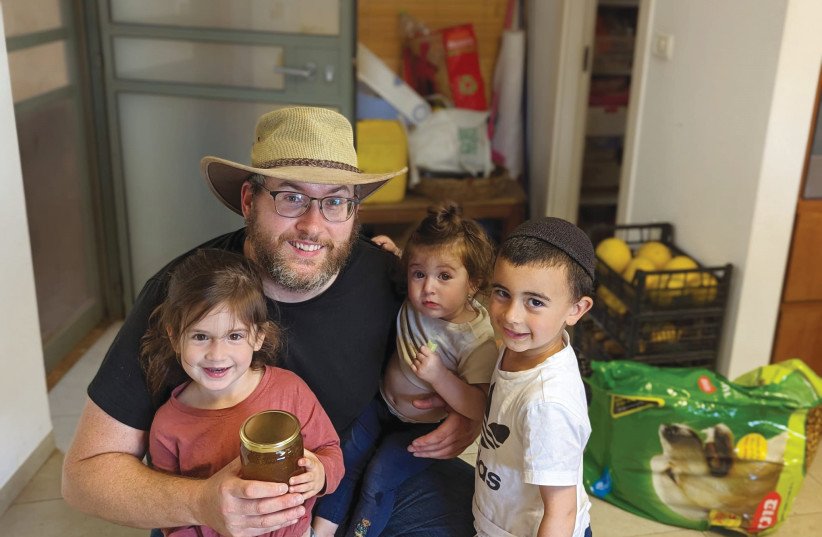Sue Lightman from Providence, Rhode Island, and Tzvi (Harry) Muslow from Shreveport, Louisiana, met at a wedding in New York in 1988. From day one, they planned to make aliyah.
“I understood,” says Sue with a laugh, “that either I was going to Israel or there would be no second date.” She didn’t need much persuading, though, as Israel had always been close to her heart.
After they wed in 1989, they lived in Shreveport, where Tzvi completed his training as a physician. They then moved to Silver Spring, Maryland, while Tzvi was doing a fellowship in gene therapy at the National Institutes of Health in Washington, DC. They finally departed for Israel in 1998 with five kids in tow.
“It was hard to leave, not knowing how often we’d see our family. Our parents helped us come back each summer to visit,” says Sue.
For two years, they lived on Kibbutz Kfar Etzion, where Tzvi served as the on-call doctor. “We had another baby while we were there, and kibbutz life was amazing for our kids,” says Sue.

“But we knew it was temporary. We searched for a year for a place that was a religious community where our kids would grow up in an Israeli environment speaking Hebrew.”
The place they decided fit the bill was Moshav Beit Gamliel, between Yavneh and Rehovot, where there were just enough English speakers to make Sue feel comfortable with her less than fluent Hebrew.
Farming the Land of Israel
Before they bought their own place on the moshav in 2005, they used available public land to grow crops and raise chickens.
“We always had a connection to agriculture,” Sue explains.
The land they bought encompassed an old house, and the farmland around it was all planted with wheat. While working as a physician – he is now at Hadassah Medical Center in Jerusalem – Tzvi spent his spare time planting five more of the biblical Seven Species; he did not plant barley out of concern that if it migrated to the wheat field, he’d be violating the prohibition of kilayim (mixed seeds).
“The farm just kept growing from there and became a family project,” says Sue, who works full time as a technical writer in Tel Aviv.
“You name a tree, and there’s a good chance we’ve grown it. Following chickens, we added ducks, pheasants, quail, turkeys, and geese. We purchased goats to eat the weeds between the trees – although that didn’t work because the animals enjoyed eating the trees more than the weeds – and then we got sheep, but with the same results,” she says.
“We added exotic fruits, planted vegetables, and built a hothouse. We have several species of bananas, including red and blue banana plants.”
Sue and Tzvi rise each morning at 4:30 to feed the animals. The Muslow children, aged 24 to 33, no longer live at home, but one daughter lives on the moshav, and her children help collect the eggs.
Meshek Muslow needs more hands than that, so volunteers are recruited internationally through Workaway and locally through SunDo, a subsidiary of Hashomer HaChadash that seeks to strengthen the connection between farmers and Israeli society.
“Recently, 33 soldiers came from SunDo and did in four hours what would have taken us four months,” says Sue.
By appointment, the Muslows give two-hour tours of the farm in English or Hebrew.
“We show visitors what it is like to farm in Israel. We talk about agriculture in general, about agriculture in Jewish law, and the relationship of agriculture and the Bible,” says Sue, adding that she feels it is a privilege to do mitzvot such as shmita (the sabbatical year for the land) and redeeming firstborn male goats, which they didn’t even know about in the United States.
“Visitors taste new fruits and visit the animals. There’s often a baby goat or chick they can hold. Over Sukkot last year, we made flags from banana leaves, and spice bags for havdalah.” Kids never go home empty-handed, always bearing a cut of sugarcane or a handmade project.
IN ADDITION to the tours, the Muslow Farm sells the Four Species for Sukkot, but mainly the arava (willow), hadas (myrtle), and lulav (date tree stem). During Sukkot, visitors can see and learn about what is involved in preparing the Four Species.
They also sell the goats and poultry, as well as run a small hatchery.
“We built the farm more for idealistic reasons,” says Sue. “This was one of our dreams, and then we had to find a way to keep it.”
Their son-in-law, Dr. Conner Brown, has taken on the beekeeping aspect. He’s been in Israel only a year, living with his wife and two kids in Modi’in and doing a fellowship in urology at Hadassah.
“The bees make me slow down and focus; it’s calming and relaxing,” he says. The beekeeping sideline produces Brown and Daughters Honey, as well as beeswax for candles.
In addition to practicing medicine, Tzvi starts and ends his day caring for the animals and working in the fields at Meshek Muslow.
“My heart will always be in Jerusalem,” he says, “but watching the meshek grow has been equally rewarding. As a religious Jew, I felt it is an obligation and privilege to take care of the land, and it fills my heart with joy.”■
For details about the farm tours in English or Hebrew: meshekmuslowfarm.com/ For information about Brown and Daughters Honey and beeswax candles: youtube.com/@BrownAndDaughters.
Sue and Tzvi (Harry) Muslow From Silver Spring, Maryland, To Moshav Beit Gamliel, 1998
